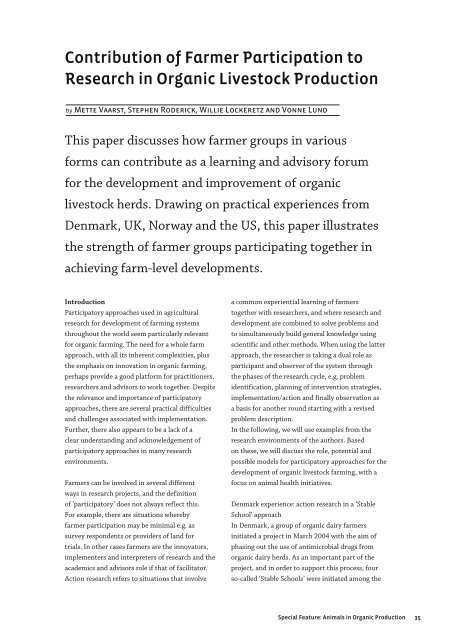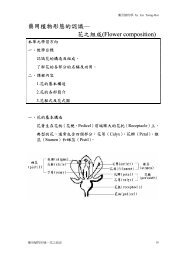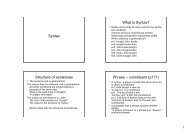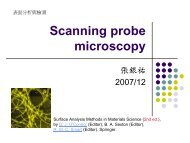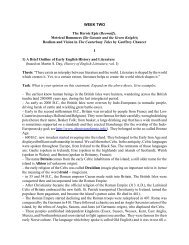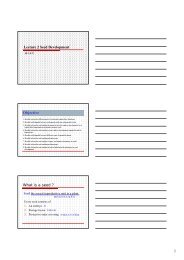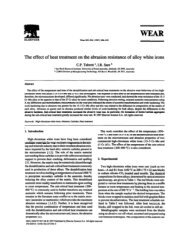Ecology and Farming
Ecology and Farming
Ecology and Farming
You also want an ePaper? Increase the reach of your titles
YUMPU automatically turns print PDFs into web optimized ePapers that Google loves.
Contribution of Farmer Participation to<br />
Research in Organic Livestock Production<br />
by Mette Vaarst, Stephen Roderick, Willie Lockeretz <strong>and</strong> Vonne Lund<br />
This paper discusses how farmer groups in various<br />
forms can contribute as a learning <strong>and</strong> advisory forum<br />
for the development <strong>and</strong> improvement of organic<br />
livestock herds. Drawing on practical experiences from<br />
Denmark, UK, Norway <strong>and</strong> the US, this paper illustrates<br />
the strength of farmer groups participating together in<br />
achieving farm-level developments.<br />
Introduction<br />
Participatory approaches used in agricultural<br />
research for development of farming systems<br />
throughout the world seem particularly relevant<br />
for organic farming. The need for a whole farm<br />
approach, with all its inherent complexities, plus<br />
the emphasis on innovation in organic farming,<br />
perhaps provide a good platform for practitioners,<br />
researchers <strong>and</strong> advisors to work together. Despite<br />
the relevance <strong>and</strong> importance of participatory<br />
approaches, there are several practical difficulties<br />
<strong>and</strong> challenges associated with implementation.<br />
Further, there also appears to be a lack of a<br />
clear underst<strong>and</strong>ing <strong>and</strong> acknowledgement of<br />
participatory approaches in many research<br />
environments.<br />
Farmers can be involved in several different<br />
ways in research projects, <strong>and</strong> the definition<br />
of ‘participatory’ does not always reflect this.<br />
For example, there are situations whereby<br />
farmer participation may be minimal e.g. as<br />
survey respondents or providers of l<strong>and</strong> for<br />
trials. In other cases farmers are the innovators,<br />
implementers <strong>and</strong> interpreters of research <strong>and</strong> the<br />
academics <strong>and</strong> advisors role if that of facilitator.<br />
Action research refers to situations that involve<br />
a common experiential learning of farmers<br />
together with researchers, <strong>and</strong> where research <strong>and</strong><br />
development are combined to solve problems <strong>and</strong><br />
to simultaneously build general knowledge using<br />
scientific <strong>and</strong> other methods. When using the latter<br />
approach, the researcher is taking a dual role as<br />
participant <strong>and</strong> observer of the system through<br />
the phases of the research cycle, e.g. problem<br />
identification, planning of intervention strategies,<br />
implementation/action <strong>and</strong> finally observation as<br />
a basis for another round starting with a revised<br />
problem description.<br />
In the following, we will use examples from the<br />
research environments of the authors. Based<br />
on these, we will discuss the role, potential <strong>and</strong><br />
possible models for participatory approaches for the<br />
development of organic livestock farming, with a<br />
focus on animal health initiatives.<br />
Denmark experience: action research in a ‘Stable<br />
School’ approach<br />
In Denmark, a group of organic dairy farmers<br />
initiated a project in March 2004 with the aim of<br />
phasing out the use of antimicrobial drugs from<br />
organic dairy herds. As an important part of the<br />
project, <strong>and</strong> in order to support this process, four<br />
so-called ‘Stable Schools’ were initiated among the<br />
Special Feature: Animals in Organic Production<br />
3


